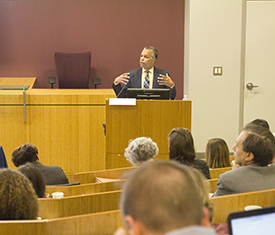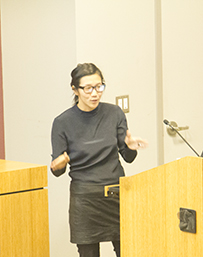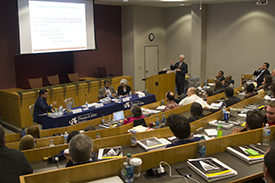It will take an interdisciplinary, diverse and well united village to curtail crime in urban communities, prominent judges and experts in law, medicine, public health and psychology said during the Drexel Law Review symposium on Oct. 16.
“Crossroads: Crime, Community, and Public Health” featured keynote addresses by Dr. John Rich, a MacArthur Fellow and professor at Drexel’s Dornsife School of Public Health, and Judge Nancy Gertner, who served on the U.S. District Court for the District of Massachusetts and now teaches Harvard Law School.
 Rich, an authority on the medical needs of African American men in U.S. cities, said that understanding the nature and lasting consequences of early hardships they often face is critical to addressing the persistence of violence and crime.
Rich, an authority on the medical needs of African American men in U.S. cities, said that understanding the nature and lasting consequences of early hardships they often face is critical to addressing the persistence of violence and crime.
“A trauma-informed perspective may help us understand behavior in a different way,” Rich said, calling for substance abuse policies to focus on cooperation and healing instead of punishment. “It doesn’t imply we don’t punish or hold people accountable. If you focus on healing in the context of accountability or punishment, you decrease the likelihood of recidivism.”
Gertner, who was appointed to the federal bench in 1994 by President Clinton, critiqued federal sentencing guidelines that were created in the 1980s to address disparities in the punishment judges imposed for drug-related crimes. Those guidelines explicitly took any consideration of an offender’s social background off the table, regardless of the ways that individuals’ early lives might have driven them toward trouble, Gertner said.
While communities have long known the difference between drug dealers who are addicts and those who are not, Gertner said judges who lacked that understanding would “wring their hands and say there was nothing they could do….There is never nothing you can do.”
A newfound bipartisan interest in addressing mass incarceration won’t be effective, Gertner warned, unless judges, prosecutors and other lawyers are educated and devote proper attention to former inmates’ re-entry into the community.
Panelists who discussed the Community and Re-Entry outlined promising developments Pennsylvania. Philadelphia’s First Judicial Mental Health Court enables convicted offenders with mental health disorders to receive appropriate supervision and case management services to address underlying addiction and mental health issues, said Judge Sheila Woods-Skipper, the president judge of the Philadelphia Court of Common Pleas. Since the court opened in 2009, she said, the court has served 314 individuals while saving taxpayers $181,000.
Professor Kirk Heilbrun, interim head of Drexel’s Department of Psychology and co-director of Pennsylvania’s Mental Health and Justice Center of Excellence, said there are numerous points in the criminal justice process for psychologists to provide expertise: from arrest to booking to incarceration and re-entry into the community. Heilbrun explained that psychologists can play an important role in training police to respond appropriately to mentally ill individuals, helping corrections officials to prevent suicide and facilitate treatment and enabling professionals in the community to facilitate re-entry.
Despite soaring incarceration rates for youth in the U.S., Professor Sandra Simkins of the Rutgers School of Law – Camden said, relatively little is known about the after-effects for teens who have been locked up. While many juvenile facilities rely on punitive isolation, Simkins said, few states have given juvenile offenders the right to counsel or required review or oversight of the institutions that house them.
A panel on Community Participation in Research noted that gathering and sharing solid information about effective public health strategies requires broad participation at all stages of the process. Community residents need to shape research goals, participate in the research process and help share findings, said Professor Amy Carroll-Scott of the Dornsife School of Public Health.
Professor Pamela Valera of the Columbia University Medical Center who co-founded the effective Bronx Reentry Working Group tied that organization’s success to the involvement of drug dealers, probation officers, ex-offenders as well as researchers’ willingness to share control over the work with community residents.
“We have to learn to give power away,” Valera said. “It is their community we are trying to understand.”
 Professor Emily Wang of at the Yale School of Medicine argued that the massive numbers of people incarcerated in recent decades has excluded 1.5 million black men, thereby skewing public health studies.
Professor Emily Wang of at the Yale School of Medicine argued that the massive numbers of people incarcerated in recent decades has excluded 1.5 million black men, thereby skewing public health studies.
“That which you think you know about public health is probably inaccurate,” said Wang, a physician who co-founded the Transitions Clinic Network, which trains former prisoners to become community health workers.
Professor Robert Kane, who directs Drexel’s Criminology and Criminal Justice Studies Program, said the mutual distrust between residents of low income neighborhoods and police also affects public health. Kane presented findings from a recent study he co-authored showing that neighborhoods in Washington, D.C. with high percentage of drug arrests have low rates of prenatal care provided to pregnant women.
A panel on Crime Prevention explored important and sometimes unexpected roles that communities can play. Professor Charles Branas, an epidemiologist at the University of Pennsylvania Perelman School of Medicine and director of the Urban Health Lab described reductions in gun violence that followed remediation of abandoned buildings and greening of vacant lots in Philadelphia neighborhoods.
While counseling people and providing medical care is essential, Branas said, removing blight can have a more lasting effect.
Those who have lost loved ones to gun violence have joined forces to offer mutual aid and urge lawmakers to identify homicide as a public health crisis, said family therapist and Mothers in Charge founder Dorothy Johnson-Speight, who received a 2015 Justice Fellowship from the Soros Foundation.
Professor Sunita Patel of the American University Washington College of Law discussed her study of U.S. Department of Justice efforts to empower communities in places where police have been heavy-handed. Consent decrees the DOJ has issued in New Orleans, Seattle, Portand and other cities have not given communities as much of a voice as was hoped, Patel has found.
 Panelists discussing the Community and Criminal Justice cited opportunities as well as obstacles. Professor Bret Asbury of the Kline School of Law said distrust toward the police that has fueled an anti-snitching ethos in Philadelphia and other communities could subside if authorities de-escalated their approach. Despite many high-profile incidents of aggressive police tactics, Asbury said he is optimistic that the rise of citizen journalists willing to record interactions between officers and community residents will discourage some abuses.
Panelists discussing the Community and Criminal Justice cited opportunities as well as obstacles. Professor Bret Asbury of the Kline School of Law said distrust toward the police that has fueled an anti-snitching ethos in Philadelphia and other communities could subside if authorities de-escalated their approach. Despite many high-profile incidents of aggressive police tactics, Asbury said he is optimistic that the rise of citizen journalists willing to record interactions between officers and community residents will discourage some abuses.
John Delaney, a deputy district attorney who supervises the Trial Division, cited a variety of tactics the District Attorney’s Office is using to forge closer ties with the community. Community Action Centers located throughout the city provide visible locations for individuals to get information about their cases, while youth panels have been assigned to work with first-time juvenile offenders.
Meanwhile, the Defender Association of Philadelphia has also launched programs to promote community involvement in the criminal justice process, said Mark Houldin, an attorney with the office. The office’s Community Oriented Defense Program assigns social workers and investigators to explore and pursue clients’ stated goals, which might include criminal record expungements and re-establishing their rights. The office is also collaborating with the DA;s office and the courts to reduce jail populations. Lastly, Houldin said, the Participatory Defense Program enables members of a defendant’s support network to help mount a defense by writing and submitting letters on a defendant’s behalf and convening gatherings for those who have experienced similar ordeals.
The symposium was organized by student editors of the Drexel Law Review as well as Professor Emily Zimmerman, Professor Robert Field and Professor Rachel Lopez.